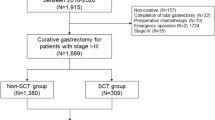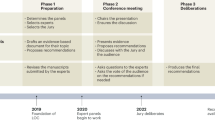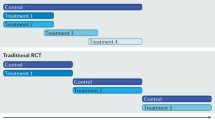Abstract
Patients with cancer generally have better outcomes when treated as part of a clinical trial compared with patients not enrolled in a clinical trial. Unfortunately, surgical participation in, and leadership of such studies, is limited. This lack of clinical investigation is adversely affecting progress in cancer surgery research and, ultimately, hinders the treatment of patients. Some of the reasons for poor surgical participation in clinical research include: limitations on funding provision; inadequate training of junior surgeons in clinical trials methodology; and inadequate support of surgical faculty members as clinical investigators. Despite these shortcomings, numerous successful surgical studies have helped to change concepts, and improve patient care in certain clinical areas. Finally, a number of possible solutions are proposed, which might improve surgical involvement in clinical trials and result in more, and better-designed and executed clinical trials in this important area of research.
This is a preview of subscription content, access via your institution
Access options
Subscribe to this journal
Receive 12 print issues and online access
$209.00 per year
only $17.42 per issue
Buy this article
- Purchase on Springer Link
- Instant access to full article PDF
Prices may be subject to local taxes which are calculated during checkout



Similar content being viewed by others
References
Unger, J. M. et al. Comparison of survival outcomes among cancer patients treated in and out of clinical trials. J. Natl Cancer Inst. 106, dju002 (2014).
Tai, E. et al. Understanding and addressing the lack of clinical trial enrollment among adolescents with cancer. Pediatrics 133, S98–S103 (2014).
Ferrari, A. & Bleyer, A. Participation of adolescents with cancer in clinical trials. Cancer Treat. Rev. 33, 603–608 (2007).
Purushotham, A. D., Lewison, G. & Sullivan, R. The state of research and development in global cancer surgery. Ann. Surg. 255, 427–432 (2012).
A National Cancer Clinical Trials System for the 21st Century: Reinvigorating the NCI Cooperative Group Program. The National Academies Press [online], (2010).
Mann, M., Tendulkar, A., Birger, N., Howard, C. & Ratcliffe, M. B. National Institutes of Health funding for surgical research. Ann. Surg. 247, 217–221 (2008).
Hartgrink, H. H. et al. Extended lymph node dissection for gastric cancer: who may benefit? Final results of the randomized Dutch Gastric Cancer Group trial. J. Clin. Oncol. 22, 2069–2077 (2004).
Peeters, K. C. et al. The TME trial after a median follow-up of 6 years: increased local control but no survival benefit in irradiated patients with resectable rectal carcinoma. Ann. Surg. 246, 693–701 (2007).
Menezes, A. S. et al. Clinical research in surgical oncology: an analysis of ClinicalTrials.gov. Ann. Surg. Oncol. 20, 3725–3731 (2013).
Panesar, S. S., Thakrar, R., Athanasiou, T. & Sheikh, A. Comparison of reports of randomized controlled trials and systematic reviews in surgical journals: literature review. J. R. Soc. Med. 99, 470–472 (2006).
McCulloch, P., Taylor, I., Sasako, M., Lovett, B. & Griffin, D. Randomised trials in surgery: problems and possible solutions. BMJ 324, 1448–1451 (2002).
Murray, J. E. Surgeon scientist. World J. Surg. 24, 757–758 (2000).
Hoffman, R. L., Hudak-Rosander, C., Datta, J., Morris, J. B. & Kelz, R. R. Goal orientation in surgical residents: a study of the motivation behind learning. J. Surg. Res. 190, 451–456 (2014).
Dawe, S. R. et al. A systematic review of surgical skills transfer after simulation-based training: laparoscopic cholecystectomy and endoscopy. Ann. Surg. 259, 236–248 (2014).
Kelz, R. R. & Morris, J. B. Patient safety and surgical training: an unhealthy relationship? Ann. Surg. 249, 877–878 (2009).
Sturm, L. P. et al. A systematic review of skills transfer after surgical simulation training. Ann. Surg. 248, 166–179 (2008).
Gallagher, A. G. et al. Virtual reality simulation for the operating room: proficiency-based training as a paradigm shift in surgical skills training. Ann. Surg. 241, 364–372 (2005).
Chitwood, W. R. Jr et al. Robotic surgical training in an academic institution. Ann. Surg. 234, 475–484 (2001).
Suliburk, J. W., Kao, L. S., Kozar, R. A. & Mercer, D. W. Training future surgical scientists: realities and recommendations. Ann. Surg. 247, 741–749 (2008).
Gaissert, H. A. et al. Mentoring clinical trials in thoracic and cardiovascular surgery: a new role for the Society of Thoracic Surgeons. Ann. Thorac. Surg. 77, 1874–1875 (2004).
Balch, C. M. The academic surgeon as a clinical investigator. J. Surg. Res. 40, 413–420 (1986).
Kestle, J. R. Clinical trials. World J. Surg. 23, 1205–1209 (1999).
Eberlein, T. J. Clinical trials methods: a course for surgeons. Bull. Am. Coll. Surg. 84, 49–53 (1999).
Palmieri, C., Wanaski, S., Panse, J. & Medeiros, B. The future of clinical cancer research: who's teaching the next generation? The Flims-Vail model. Eur. J. Cancer 40, 173–175 (2004).
Department of Surgery Center for Prospective Trials. The Children's Mercy Hospital. The Children's Mercy Hospital [online], (2015).
Department of Surgery. Leiden University Medical Centre [online], (2015).
You, Y. N. et al. Improved surgeon performance in clinical trials: an analysis of quality assurance audits from the American College of Surgeons Oncology Group. J. Am. Coll. Surg. 203, 269–276 (2006).
You, Y. N. & Wells, S. A. Jr. Clinical trials in surgery: the role of the American College of Surgeons Oncology Group. World J. Surg. 30, 1147–1151 (2006).
You, Y. N. & Wells, S. A. Jr. Role of surgeons in clinical trials for thyroid cancer. World J. Surg. 31, 987–995 (2007).
McGinn, F. P. et al. Randomized trial of laparoscopic cholecystectomy and mini-cholecystectomy. Br. J. Surg. 82, 1374–1377 (1995).
Ji, W. et al. A randomized controlled trial of laparoscopic versus open cholecystectomy in patients with cirrhotic portal hypertension. World J. Gastroenterol. 11, 2513–2517 (2005).
Johansson, M. et al. Randomized clinical trial of open versus laparoscopic cholecystectomy in the treatment of acute cholecystitis. Br. J. Surg. 92, 44–49 (2005).
Rosenmuller, M. H. et al. Expertise-based randomized clinical trial of laparoscopic versus small-incision open cholecystectomy. Br. J. Surg. 100, 886–894 (2013).
American Society of Clinical Oncology. Impact Survey: Federal Funding Cuts to Cancer Research. The American Society of Clinical Oncology [online], (2013).
Eckhouse, S. & Sullivan, R. A survey of public funding of cancer research in the European union. PLoS Med. 3, e267 (2006).
Eckhouse, S., Lewison, G. & Sullivan, R. Trends in the global funding and activity of cancer research. Mol. Oncol. 2, 20–32 (2008).
Eckhouse, S. & Sullivan, R. The state of academic cancer surgery in the UK. Mol. Oncol. 2, 206–212 (2008).
Jungbluth, S. et al. Europe combating cancer: the European Union's commitment to cancer research in the 6th Framework Programme. Mol. Oncol. 1, 14–18 (2007).
Stuckler, D., King, L., Robinson, H. & McKee, M. WHO's budgetary allocations and burden of disease: a comparative analysis. Lancet 372, 1563–1569 (2008).
Ehrlich, P. F. et al. Lessons learned from a failed multi-institutional randomized controlled study. J. Pediatr. Surg. 37, 431–436 (2002).
Ford, E. et al. Clinicians' attitudes towards clinical trials of cancer therapy. Br. J. Cancer 104, 1535–1543 (2011).
Horton, R. Surgical research or comic opera: questions, but few answers. Lancet 347, 984–985 (1996).
McCulloch, P. et al. IDEAL framework for surgical innovation 1: the idea and development stages. BMJ 346, f3012 (2013).
Barkun, J. S. et al. Evaluation and stages of surgical innovations. Lancet 374, 1089–1096 (2009).
Ergina, P. L. et al. Challenges in evaluating surgical innovation. Lancet 374, 1097–1104 (2009).
McCulloch, P. et al. No surgical innovation without evaluation: the IDEAL recommendations. Lancet 374, 1105–1112 (2009).
Macdonald, J. S. et al. Chemoradiotherapy after surgery compared with surgery alone for adenocarcinoma of the stomach or gastroesophageal junction. N. Engl. J. Med. 345, 725–730 (2001).
Cunningham, D. et al. Perioperative chemotherapy versus surgery alone for resectable gastroesophageal cancer. N. Engl. J. Med. 355, 11–20 (2006).
Dikken, J. L. et al. Neo-adjuvant chemotherapy followed by surgery and chemotherapy or by surgery and chemoradiotherapy for patients with resectable gastric cancer (CRITICS). BMC Cancer 11, 329 (2011).
Krijnen, P., den Dulk, M., Meershoek-Klein Kranenbarg, E., Jansen-Landheer, M. L. & van de Velde, C. J. Improved survival after resectable non-cardia gastric cancer in The Netherlands: the importance of surgical training and quality control. Eur. J. Surg. Oncol. 35, 715–720 (2009).
den Dulk, M. et al. Improved overall survival for patients with rectal cancer since 1990: the effects of TME surgery and pre-operative radiotherapy. Eur. J. Cancer 44, 1710–1716 (2008).
Jayne, D. G. et al. Randomized trial of laparoscopic-assisted resection of colorectal carcinoma: 3-year results of the UK MRC CLASICC Trial Group. J. Clin. Oncol. 25, 3061–3068 (2007).
Clinical Outcomes of Surgical Therapy Study Group. A comparison of laparoscopically assisted and open colectomy for colon cancer. N. Engl. J. Med. 350, 2050–2059 (2004).
Colon Cancer Laparoscopic or Open Resection Study Group. et al. Survival after laparoscopic surgery versus open surgery for colon cancer: long-term outcome of a randomised clinical trial. Lancet Oncol. 10, 44–52 (2009).
van der Pas, M. H. et al. Laparoscopic versus open surgery for rectal cancer (COLOR II): short-term outcomes of a randomised, phase 3 trial. Lancet Oncol. 14, 210–218 (2013).
Higgins, J. P. et al. The Cochrane Collaboration's tool for assessing risk of bias in randomised trials. BMJ 343, d5928 (2011).
von Elm, E. et al. The Strengthening the Reporting of Observational Studies in Epidemiology (STROBE) statement: guidelines for reporting observational studies. Lancet 370, 1453–1457 (2007).
von Elm, E. et al. The Strengthening the Reporting of Observational Studies in Epidemiology (STROBE) statement: guidelines for reporting observational studies. J. Clin. Epidemiol. 61, 344–349 (2008).
Lane, J. A. et al. Active monitoring, radical prostatectomy, or radiotherapy for localised prostate cancer: study design and diagnostic and baseline results of the ProtecT randomised phase 3 trial. Lancet Oncol. 15, 1109–1118 (2014).
Lane, J. A. et al. Latest results from the UK trials evaluating prostate cancer screening and treatment: the CAP and ProtecT studies. Eur. J. Cancer 46, 3095–3101 (2010).
Veronesi, U. et al. A randomized comparison of sentinel-node biopsy with routine axillary dissection in breast cancer. N. Engl. J. Med. 349, 546–553 (2003).
Lyman, G. H. et al. Sentinel lymph node biopsy for patients with early-stage breast cancer: American Society of Clinical Oncology clinical practice guideline update. J. Clin. Oncol. 32, 1365–1383 (2014).
Fleissig, A. et al. Post-operative arm morbidity and quality of life. Results of the ALMANAC randomised trial comparing sentinel node biopsy with standard axillary treatment in the management of patients with early breast cancer. Breast Cancer Res. Treat. 95, 279–293 (2006).
Galimberti, V. et al. Axillary dissection versus no axillary dissection in patients with sentinel-node micrometastases (IBCSG 23–01): a phase 3 randomised controlled trial. Lancet Oncol. 14, 297–305 (2013).
Giuliano, A. E. et al. Axillary dissection vs no axillary dissection in women with invasive breast cancer and sentinel node metastasis: a randomized clinical trial. JAMA 305, 569–575 (2011).
Donker, M. et al. Comparison of the sentinel node procedure between patients with multifocal and unifocal breast cancer in the EORTC 10981–22023 AMAROS Trial: identification rate and nodal outcome. Eur. J. Cancer 49, 2093–2100 (2013).
MacFarlane, J. K., Ryall, R. D. & Heald, R. J. Mesorectal excision for rectal cancer. Lancet 341, 457–460 (1993).
Bosset, J. F. et al. Fluorouracil-based adjuvant chemotherapy after preoperative chemoradiotherapy in rectal cancer: long-term results of the EORTC 22921 randomised study. Lancet Oncol. 15, 184–190 (2014).
Lefevre, J. H. et al. A multicentric randomized controlled trial on the impact of lengthening the interval between neoadjuvant radiochemotherapy and surgery on complete pathological response in rectal cancer (GRECCAR-6 trial): rationale and design. BMC Cancer 13, 417 (2013).
den Dulk, M. et al. Quality of surgery in T3–4 rectal cancer: involvement of circumferential resection margin not influenced by preoperative treatment. Results from EORTC trial 22921. Eur. J. Cancer 43, 1821–1828 (2007).
Birkmeyer, J. D. et al. Hospital volume and surgical mortality in the United States. N. Engl. J. Med. 346, 1128–1137 (2002).
Birkmeyer, J. D., Sun, Y., Wong, S. L. & Stukel, T. A. Hospital volume and late survival after cancer surgery. Ann. Surg. 245, 777–783 (2007).
Finks, J. F., Osborne, N. H. & Birkmeyer, J. D. Trends in hospital volume and operative mortality for high-risk surgery. N. Engl. J. Med. 364, 2128–2137 (2011).
Sant, M. et al. EUROCARE-4. Survival of cancer patients diagnosed in 1995–1999 results and commentary. Eur. J. Cancer 45, 931–991 (2009).
van de Velde, C. J. et al. Experts reviews of the multidisciplinary consensus conference colon and rectal cancer 2012: science, opinions and experiences from the experts of surgery. Eur. J. Surg. Oncol. 40, 454–468 (2014).
Dikken, J. L. et al. Differences in outcomes of oesophageal and gastric cancer surgery across Europe. Br. J. Surg. 100, 83–94 (2013).
van de Velde, C. J. et al. EURECCA colorectal: multidisciplinary mission statement on better care for patients with colon and rectal cancer in Europe. Eur. J. Cancer 49, 2784–2790 (2013).
van de Velde, C. J. et al. EURECCA colorectal: multidisciplinary management: European consensus conference colon & rectum. Eur. J. Cancer 50, e1–e34 (2014).
Knebel, P., Kuhn, S., Ulrich, A. B., Buchler, M. W. & Diener, M. K. The Study Centre of the German Surgical Society: current trials and results. Langenbecks Arch. Surg. 397, 611–618 (2012).
Demetri, G. D. et al. Efficacy and safety of imatinib mesylate in advanced gastrointestinal stromal tumors. N. Engl. J. Med. 347, 472–480 (2002).
Author information
Authors and Affiliations
Contributions
Both authors made substantial contributions to researching data for the article, discussions of article content, writing and editing the manuscript.
Corresponding author
Ethics declarations
Competing interests
The authors declare no competing financial interests.
Rights and permissions
About this article
Cite this article
Naredi, P., La Quaglia, M. The future of trials in surgical oncology. Nat Rev Clin Oncol 12, 425–431 (2015). https://doi.org/10.1038/nrclinonc.2015.72
Published:
Issue Date:
DOI: https://doi.org/10.1038/nrclinonc.2015.72
This article is cited by
-
What can we learn from oncology surgical trials?
Nature Reviews Clinical Oncology (2016)



